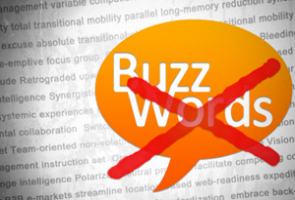There’s a reason why they’re called “buzz” words, and it isn’t what you think.
In fact, it isn’t even what the person or entity who coined the phrase thinks.
The simple fact of the matter is that “buzzword” isn’t a positive descriptor. It’s supposed to mean “attention-getting,” but more often than not it simply means “irritating.” Now allow me to let you in on a secret: Your audience hates buzzwords. They know that they’re being sold when they read them, and they have a tendency to move on quickly when they see one being in an overtly in-your-face manner.
Now let me preface any further comments here by saying that virtually all marketers have used these words and phrases before, and they aren’t going away. If, however, you really want your copy to stand out, you don’t need them. I’m going to show you a few of these words and offer a few ideas that can help you develop a brand message that is all your own without them.
1. “All Filler, No Killer” Buzzwords
Leading our list are five of the biggest landing-page killers around. These words and phrases tell your readers that you’ve opted for sensationalism over substance and feel the need to dress your brand message in the marketing-speak equivalent of iridescent sequins. If you want your readers to make it past your headline, omit the following buzzwords from them starting now:
• Industry-leading
• Cutting-edge
• World-class
• Undisputed
• Premium
For starters, what evidence do you have that your product or service is “industry-leading?” Where’s your research? Where can people verify your “top ratings?” How do you intend to prove that your product or service is the “best ever?” If you can’t answer these questions, don’t put them in your readers’ heads. Instead of puffing up the product, why not try using language that plays to the experience of it? Instead of saying “best ever,” why not try, “your new favorite”? If you can make it their favorite, it becomes – by definition – the best ever for them. See what we did there? We made it about the buyer, not the product, and that makes a huge difference.
2. “New and Improved” Illusion Buzzwords
• Breakthrough
• Groundbreaking
• Pioneering
• Revolutionary
• Next-Gen
Again, what about your product is truly “groundbreaking?” What makes yours different from the rest? Unless you can back up your claim with hard evidence (research, development, patents, etc.) you’re far better off shying away from words that suggest that you’re offering something people can’t find someplace else. Instead of trying to convince them that yours is the only company capable of delivering product x, simply convince them that your company is the best place to find it. Talk up your customer service, your ability to deliver quickly and efficiently, and the real benefits your buyers or clients will enjoy if they decide to give you their business.
3. Silly Superlative Buzzwords
When you start speaking in superlatives, most people’s immediate reaction is, “Yeah? Prove it!” Are you noticing a trend here? This is precisely why you need to shy away from using phrases like these:
• Best-ever
• Top-rated
• Most-anticipated
• Highest-quality
If you feel like you really can’t get away from some of these, you can cushion the blow and save your brand some credibility by simply adding the word “our” to the beginning of them. “Our best ever” is much easier to swallow. People will be quicker to regard the statement as one based on internal research and development as opposed to comparing your product or service to all those similar in the whole wide world.
Remember that your buyers and clients have options, and, as such, you should never insult their intelligence by making more of your product or service than there is to be made. There is nothing wrong with suggesting that yours is a good source (or even the best source) for the things they want or need. In fact, I’ve said many times that good marketers know how to do this and do it well. What you don’t want to do is come right out and say it. Instead, show it through the quality of your content and your commitment to meeting and exceeding people’s expectations.
Think you might need help finding that delicate balance? Consider hiring a copywriting company to either develop or review your content for you, and be open to suggestions on how to make it better.
